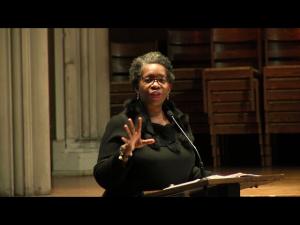Thank God for Womanist Theology, But…
As a new Anabaptist, I subscribe the magazine “Anabaptist World.” If you are an Anabaptist (e.g., Mennonite) or have real interest in what is happening among various kinds of Anabaptists today, you really ought to subscribe to “Anabaptist World.”
I am a “new Anabaptist” only in the sense that, for the first time, finally, I attend a Mennonite church. I have inclined toward Anabaptist theology and practice for many years, regarding the early Anabaptists as our Baptist spiritual ancestors. (I’ve been Baptist for about 35 years since leaving the Pentecostal tradition in which I was raised.)
The current issue of Anabaptist World (March 24, 2023) has a theme: “The liberating power of womanist theology”—to acknowledge and affirm Women’s History Month.
Just to surround my following comments with some context…I have taught liberation theologies for many years and mostly in a positive way. Among the liberation theologies I have taught is Womanist Theology. I have read books by Womanist theologians such as Jacquelyn Grant and Delores Williams. I have asked students interested in Womanist theology to give lengthy presentations to our classes about the subject.
Also, I have been a member of three Baptist churches pastored by women; I have always affirmed women’s equality in church life and in society as a whole. I am a “biblical egalitarian” and once was invited to give a plenary address to an annual convention of the organization Christians for Biblical Equality. I have always done my best as a theology professor and minister to encourage women students (and others) to follow God’s call into ministry at any level, including as lead pastors, church planters, missionaries, denominational leaders, with no limits based on sex or gender.
I have also taught Black Theology including having students read James Cone, Deotis Roberts (who I tried to recruit to teach at the seminary where I taught), and Major Jones (less known than the others but a very evangelical Methodist theologian now deceased).
This current issue of “Anabaptist World” warmed my heart with sayings like this from one article’s author: “Womanist theology contributes to liberation from harm based on race and gender. Bearing the scars of generational trauma, Black women have much to teach about resilience. Nothing could be more valuable and sacred.” (“The ‘God who calls us sacred’: Theology that empowers Black women points all toward liberation,” p.7)
However…several writers in this issue mention positively Womanist theologian Delores Williams who recently died at age 88 after a stellar career as a promoter of liberation of women, especially Black women, from sexism, racism, and all forms of oppression. And some statements made by some of the writers in this issue seem to agree with Williams that Christianity can and should move away from any belief in Christ’s atonement on the cross that involved saving sacrifice.
One writer says “God saves out of empathy and compassion, not to make a sacrifice for human sin. … a sacrificial theology justified abuse and suffering. … I didn’t need any more of that.” (P. 11) This seems to echo Delores Williams’s famous or infamous quotation that “I don’t think we need a theory of atonement at all. I think Jesus came for life and (to show us) how to live together, what life was all about. … I don’t think we need folks hanging on crosses, and blood dripping, and weird stuff. … I think the cross ought to be interpreted for what it was, a symbol of evil, the murder of an innocent man and victim.” (Quoted in “The death of radical feminist theology,” in juicyecumenism, December 9, 2022.)
Thank God for Womanist Theology…for raising the issue of the wonderful contributions women, both Black and other, can and do make to our Christianity. However, I worry about some Womanist theologians (and about some of the articles in this issue of Anabaptist World) because they seem to think that Jesus Christ was a man who died a martyr’s death to identify with those who suffer oppression and that he was not God incarnate voluntarily dying on the cross to save us, to reconcile us to God. Why not both?
I think it would have been better if Anabaptist World had included at least one article raising some biblical and theological questions about the treatment of Christ’s death and atonement by at least some Womanist (and other) theologians. One might rightly or wrongly get the impression from this issue that the editors have no qualms about the dismissal of traditional belief in Christ’s atoning death by some of the writers and the theologians they mention with strong agreement.
*Note: If you choose to comment, make sure your comment is relatively brief (no more than 100 words), on topic, addressed to me, civil and respectful (not hostile or argumentative), and devoid of pictures or links.*














